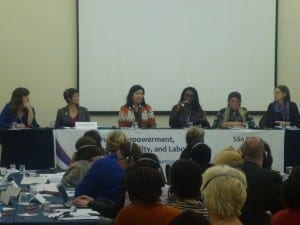Jul 15, 2013
Over the last two weeks, anonymous callers have threatened the life of long-time Honduran union leader and radio talk show host José María Martínez, whose vocal support for the rights of banana and other agricultural workers has made him a target.
For the past 20 years, Martínez, head of communications with the Honduran federation of agro-industrial unions, FESTAGRO, has hosted a daily radio show called “Trade Unionist on Air,” which features discussions about labor and human rights, including an opportunity for agricultural workers to call in and ask about abusive workplaces, labor standards and rights violations.
Since September 2012, Martínez has been working closely with workers at the Tres Hermanas banana plantations as they pushed to win a collective bargaining agreement in the face of harsh employer repression, including the firing of workers for their union activity. Since May, the struggle of the Tres Hermanas workers has been a frequent topic on his radio program.
On multiple occasions and with increasing frequency, unidentified callers have phoned Martínez and his family demanding that he shut his mouth or they will do it for him. He was told: “Prepare your burial clothes because we are going to kill you.”
On July 5, those threats escalated as a car without license plates staked out Radio Progreso, home to “Trade Unionist on Air.” The vehicle circle Martínez’s place of work four times at the hour Martinez was getting off air. He was forced to escape through a back exit, escorted by Father Ismael Moreno, the Catholic priest who serves as the director for Radio Progreso.
Local police have warned Martinez not to leave his home without first notifying them for his own protection.
According to FESTAGRO, since 2009, 31 trade unionists, 52 rural workers and 28 journalists have been murdered in Honduras.
Jul 13, 2013

Brazilian trade union leaders joined Solidarity Center Executive Director Shawna Bader-Blau (second from left) at the opening plenary. Credit: Matt Hersey/Solidarity Center
Women at every level are “moving the labor movement in new directions” and “inventing new kinds of worker organizations and new ways of being a trade unionist,” says labor historian Dorothy Sue Cobble.
Cobble, distinguished professor of history and labor studies at Rutgers University, was among several speakers opening a two-day Solidarity Center conference this morning, “Women’s Empowerment, Gender Equality and Labor Rights: Transforming the Terrain.” Nearly 100 labor and community activists from 20 countries are gathered here in São Paulo, Brazil, to share strategies for achieving gender equality and worker rights in their unions and their workplaces.
Gender equality is the “unfinished business of the labor movement,” said Solidarity Center Executive Director Shawna Bader-Blau in conference’s keynote speech. “The strategic exploitation of women workers for the economic gain of business is one of the key global dynamics driving down wages and working conditions, and keeping working people from their rights across the globe.
“If we want to stem the unrelenting race to the bottom, we must fight for workers at the bottom of the supply chain, starting with the women,” she said.
Three Brazilian trade union leaders described their efforts to make gender equality and women’s issues central to their unions and part of legislative priorities.
“We have fought very hard, we Brazilian women, to take up the spaces of power,” said Maria Auxiliadora dos Santos, women’s secretary at Forca Sindical. “We have to say, `Men will not speak in our name.’” More than 100 million women live in Brazil, yet they hold only 13.7 percent of executive positions and are only 22 percent of managment, dos Santos said. But over the past 10 years, the governing Worker’s Party has enabled women to make tremendous gains because of the the focus on alleviating poverty and improving the economic rights of workers.
Rosana Sousa de Deus, an executive committee member from Central Única dos Trabalhadores (CUT), Cassia Bufelli, women’s secretary at União Geral dos Trabalhadores (UGT) and Lais Abramo, director of the International Labor Orgnization in Brazil, also spoke this morning.
Gertrude Mtsweni, national gender coordinator for the Congress of South African Trade Unions (COSATU), shared how women unionists pushed for creation of a full-time gender coordinator position and gender coordinator chairpersons throughout COSATU. “A conscious effort was made to build an active gender structure,” Mtsweni said. The federation also integrates gender issues in collective bargaining and wages campaigns on a variety of issues crucial for women, including prevention of workplace sexual harassment and violence and creation of child care facilities.
Sally Choi, project coordinator for the Hong Kong Confederation of Trade Unions (HKCTU) on China and International Affairs, discussed HKCTU`s recent victory in moving the government toward improving the nation’s workplace sexual harassment laws, so that women in service and retail jobs are covered. An organizer and researcher, Choi has coordinated gender and labor programs in mainland China and has been active in the local women’s movement in Hong Kong, Special Administrative Region of China for 10 years.
As Cobble summed up the conference goal: “Our challenge over the next two days is to think about how to sustain these new efforts, to learn from and spread their wisdom, to capture their stories and let the world know that labor women will not and are not being silenced.”
Jul 12, 2013

Members of UMT in Morocco back workers in Fez who are seeking to form a union. Credit: ITF
The Moroccan workers federation, UMT, is condemning an attack on workers and their families in Fez during a peaceful sit-in this week.
On July 8, security forces physically assaulted the workers, employed by City Bus, as they protested the company’s firing of workers who sought to form a union. Their spouses and children also may have been injured, according to the International Transport Workers Federation (ITF). In addition, police arrested two UMT staff, Aziz Bounar and Ahmed Nacer.
The workers say that after City Bus was contracted to manage urban transportation in Fez last September, working conditions have deteriorated and their efforts to form a union have been met with strike-breaking and the use of police to remove striking workers.
The City Bus workers have received support from transport unions, which joined in solidarity rallies with the workers this spring, and the ITF, which has written to the Moroccan government to call for justice for the workers.
The UMT says it “strongly condemns this violent attack on innocent workers,” and is demanding that “the government and the public authorities intervene urgently to release the persons arrested and to reinstate the sacked workers to their jobs.”
Jul 10, 2013
July 10, 2013—Newspapers in Bangladesh this week reported that charges against two worker rights advocates will be dropped and that the search for the people who tortured and murdered labor leader Aminul Islam last year will receive new focus. The news follows the decision by the U.S. government to suspend preferential trade benefits with Bangladesh because of chronic and severe labor rights violations.
Kalpona Akter and Babul Akhter were imprisoned in 2010 on false charges for trying to improve the working conditions of garment workers. While imprisoned, Kalpona, executive director of the Bangladesh Center for Worker Solidarity (BCWS), says she was interrogated for long periods and Babul was beaten. Kalpona and Babul, president of the Bangladesh Garments & Industrial Workers Federation (BGIWF), were later freed on bail.
The government has not officially informed Kalpona or Babul that the charges have been dropped, according to Solidarity Center staff in Dhaka, the capital.
In April 2012, Aminul’s body was found dozens of miles from his home, with signs of torture. Despite international outcry, including a U.S. congressional hearing and then U.S. Secretary of State Hillary Clinton’s call for justice in the case, his murder has gone unsolved. He had sought to improve the working conditions of some 8,000 garment workers employed by Shanta Group, a garment manufacturer based in Dhaka. In 2010, Aminul also was arrested and beaten for his labor activism.
“If true, the Solidarity Center is pleased that these false charges have been dropped because that would demonstrate that the government of Bangladesh can act when it has the political will and motivation to do so,” says Tim Ryan, Solidarity Center Asia Regional Director.
On June 27, the United States suspended its Generalized System of Preferences (GSP) agreement with Bangladesh. Because the benefits are suspended and not terminated, Bangladesh has the opportunity to again qualify for the GSP benefit by improving worker rights, laws and practices. A key measure of that program will be whether newly registered unions will be allowed to represent worker interests.
The Solidarity Center has been working with the BCWS since the 1990s through BGIWF to educate garment workers about their rights under Bangladeshi law and international labor standards.
Jul 3, 2013
Peruvian textile unions are gaining broad international support for repeal of a law that limits garment worker rights. The 1978 law subjects workers to temporary contracts without the right to collectively bargain, strike or join a union. Between 80 and 100 percent of the country’s textile workers are on short-term contracts, an employment tactic that enables employers in Peru and around to world deny workers job security, seniority rights and health benefits, often while paying them low wages.
Since passage of the law, Peru’s textile industry has grown by 2,000 percent, yet garment workers sometimes labor up to 14 hours a day to earn a minimum wage, which represents only a quarter of what they need to survive.
“Some people … have worked 25 years on temporary contracts of six months or less,” said IndustriALL General Secretary Jyrki Raina, during a recent trip to Peru to meet with employers, government officials and lawmakers to call for repeal of the law. In March, six international apparel companies signed a letter to Peruvian President Ollanta Humala Tassosupporting repeal of the Non-Traditional Export Promotion Law, Decree 22342. The corporations, which include Nike and the parent companies of Tommy Hilfiger and Calvin Klein, argued that the law’s repeal would demonstrate the government’s support for decent working conditions.
The International Labor Organization (ILO) has repeatedly urged the government to repeal the law, a move supported by the International Textile, Garment and Leather Workers’ Federation (ITGWLF), the International Metalworkers’ Federation (IMF) and the International Federation of Chemical, Energy, Mine and General Workers (ICEM).
Raina and the global union movement also are urging the Peruvian Congress to pass a bill introduced more than a year ago that would ensure equal rights for textile and garment workers. The bill is stuck in a congressional committee.
In 2011, a court ruled in favor of 129 textile workers whose contracts were not renewed, finding that some of the workers had worked up to 10 years on short-term contracts. In the ruling, the judge stated that Decree 22342 and its “exceptional” short-term contracting scheme were no longer necessary to support the growth of the country’s textile and apparel sector.
In fact, Peru has pledged to double its textile and apparel exports—which make up 60 percent of Peru’s value-added exports—by 201


